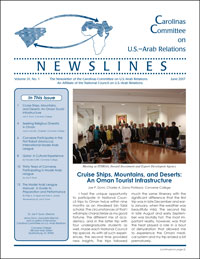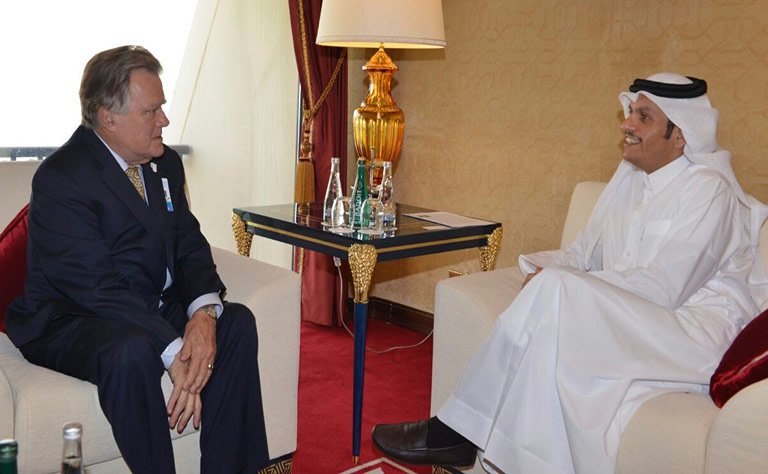Download as PDF
For the last twenty-seven years, today has marked the anniversary of an infamous event: Iraq’s brutal invasion and subsequent occupation of Kuwait, which began on August 2, 1990, and which was brought to an end on February 28, 1991. The regional and international effects of numerous aspects of the trauma then inflicted upon Kuwait remain ongoing. Like Kuwait itself, the world, even now, has yet to fully recover.

National Council on U.S.-Arab Relations Founding President and CEO Dr. John Duke Anthony was one of the first American civilians into Kuwait following its liberation. He would return there twelve times over following year with delegations of American leaders tasked with assisting in one or more facets of the war-torn country’s reconstruction. He is here with his escort observing one among over 650 of Kuwait’s oil wells set ablaze by the retreating Iraqi armed forces. Photo: National Council on U.S.-Arab Relations.
Over a quarter century later, important postwar facets of what Iraq did to Kuwait fall short of definitive closure. And they defy effective description. The international legal requirement that an aggressor provide prompt, adequate, and effective compensation for a war’s victims was not honored at the end of hostilities. Despite continuing United Nations-supervised efforts to collect on this inhumane debt, what is due has still not been paid.
The Missing in Action and Context
A full accounting of Kuwait’s and other countries’ missing citizens swept up and carted off to Iraq in the war’s waning hours – in the immediate aftermath of the conflict its main cause celebre – continues to remain incomplete. The reason is not for lack of effort. After Kuwait’s liberation, an informal and unofficial effort was mounted by George Washington University’s Elliott School of International Affairs to provide an estimate of the MIAs’ status.
The focus group included diplomats, scholars, media representatives, American armed forces’ civil affairs personnel, and other individuals who fought to liberate Kuwait. Their unscientific consensus reported that more than 400 of the missing Kuwaitis died after they were captured. The fate of more than 200 of the missing, however, was unknown.

In the immediate hours and early days following Kuwait’s liberation, when none of the country’s electric power, desalination water purification plants, and far more of the country’s infrastructure were left operative, and domestic security prospects had been rendered uncertain, armed personnel carriers and mounted automatic weaponry units were omnipresent in the country. Photo: Dr. John Duke Anthony.
That possibly countless others remain missing is no small matter. The numbers in question, to some, may seem few. Not so, however, for those among the loved ones who tear up at the thought of them. Not so either for those who, despite the absence of grounds to warrant optimism for a fortuitous ending to their pining, and continue to wait and pray for their return.
We Americans would do well to stop and think about this for a moment. We are often criticized, and rightly so, for having an empathy deficit when it comes to understanding the suffering of people in other countries and situations. An irony in this needs to be understood and underscored. The irony is that many in the United States demand that people in other countries understand us. For those in front of an American Consular Officer with ticket in hand to visit a friend or relative in Atlanta, Baltimore, Chicago, or wherever, but who lack such empathy along with the understanding and civility that comes with it, they need to be wished good luck in obtaining a visa to the United States.
Continue reading »
 Complete audio recordings from the National Council on U.S.-Arab Relations’ 26th Arab-U.S. Policymakers Conference, “Arab-U.S. Relations: How Best to Navigate an Uncertain Present and Future?” are now available from the Council. Listen to and download each session below, or visit the National Council’s podcast feed through iTunes or FeedBurner to access recordings from the conference along with other Council programs.
Complete audio recordings from the National Council on U.S.-Arab Relations’ 26th Arab-U.S. Policymakers Conference, “Arab-U.S. Relations: How Best to Navigate an Uncertain Present and Future?” are now available from the Council. Listen to and download each session below, or visit the National Council’s podcast feed through iTunes or FeedBurner to access recordings from the conference along with other Council programs.








You must be logged in to post a comment.